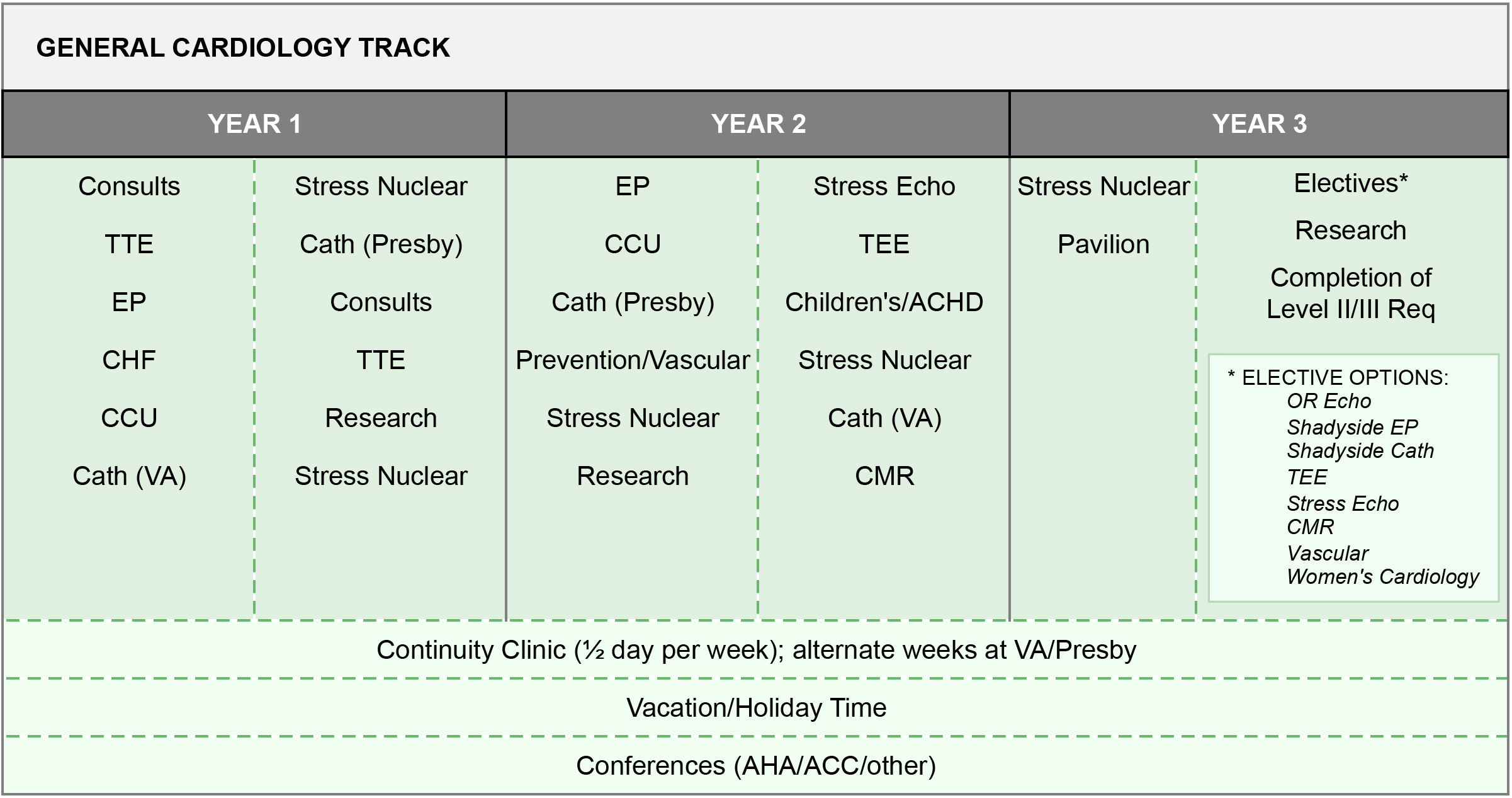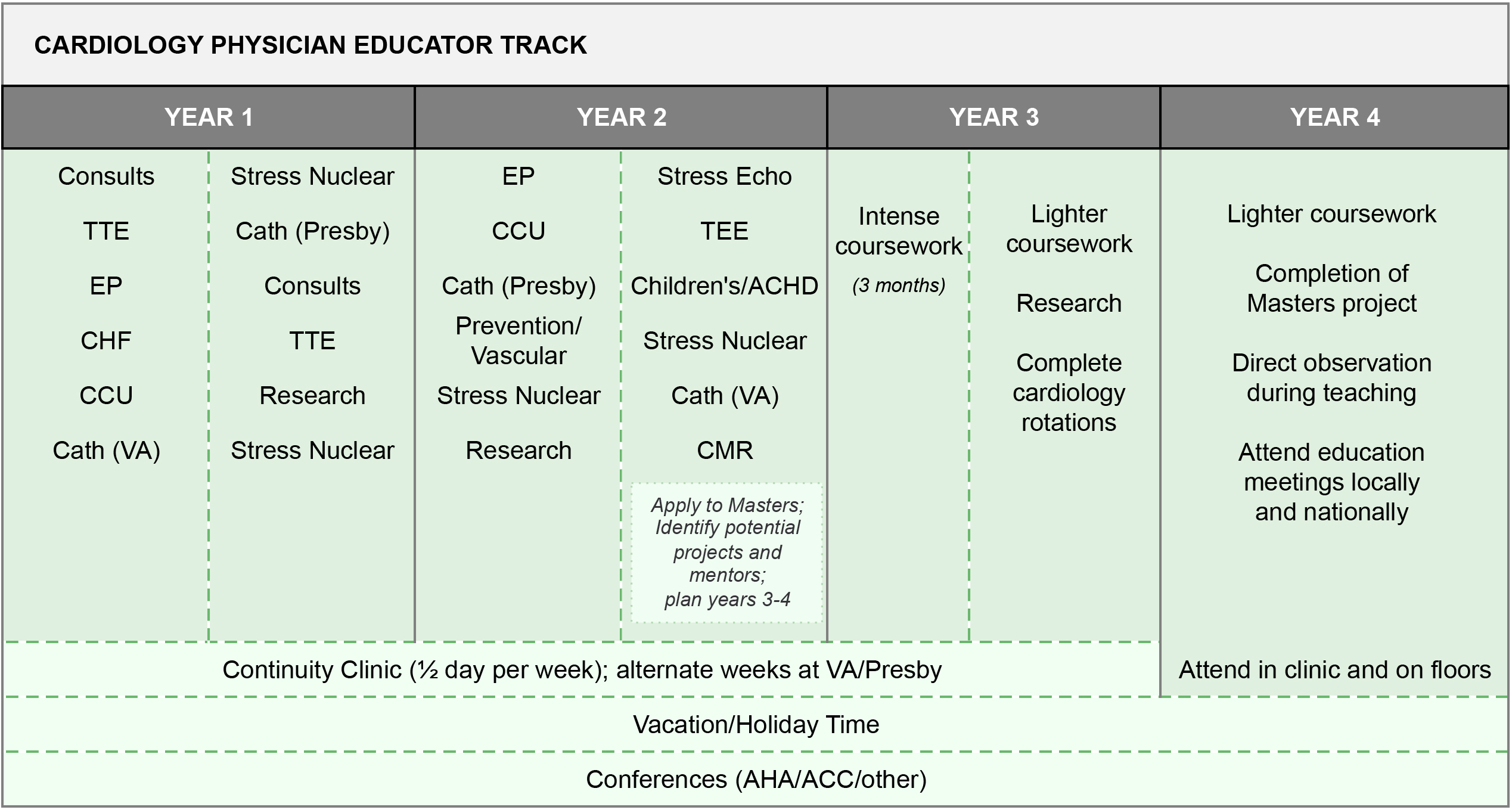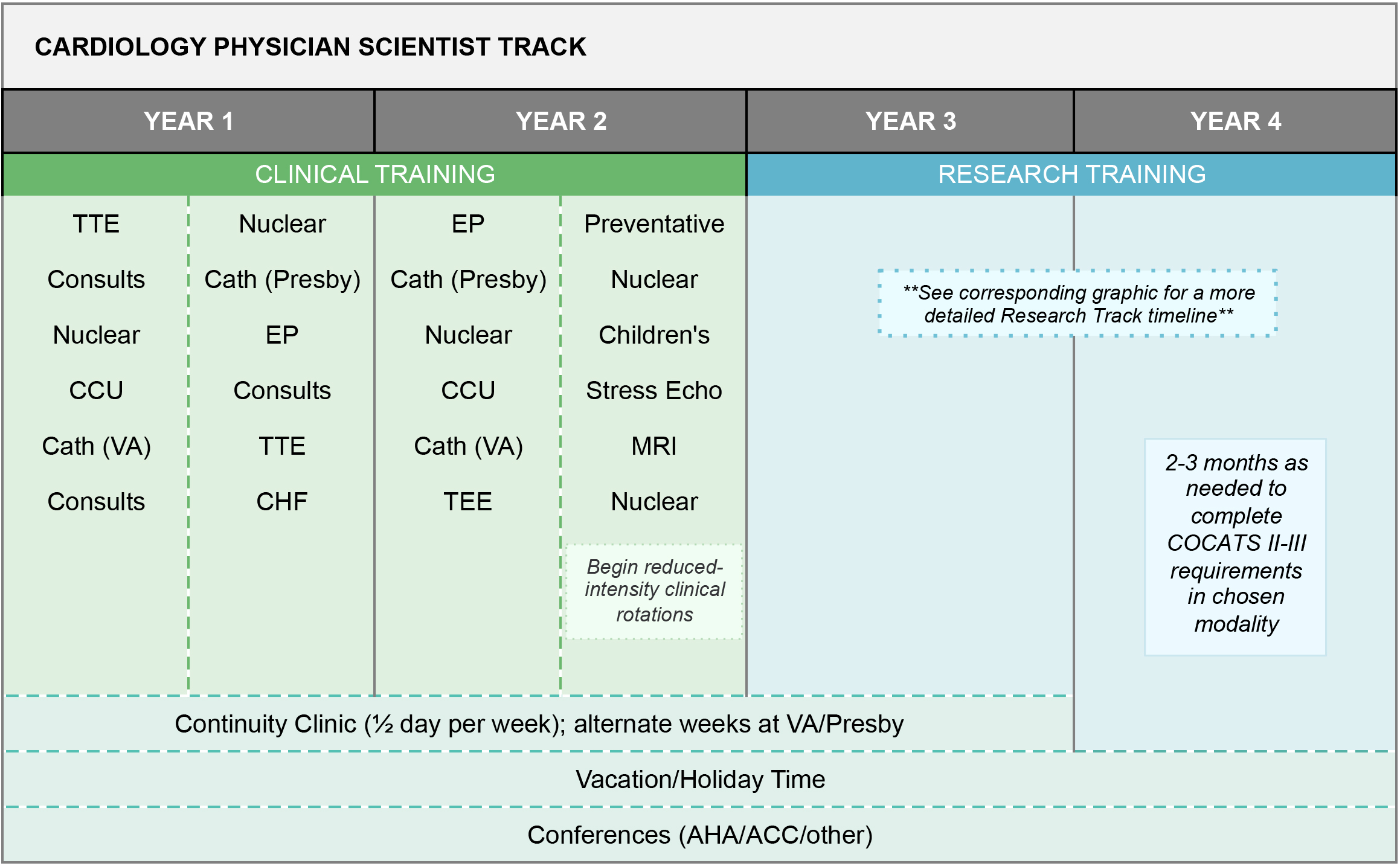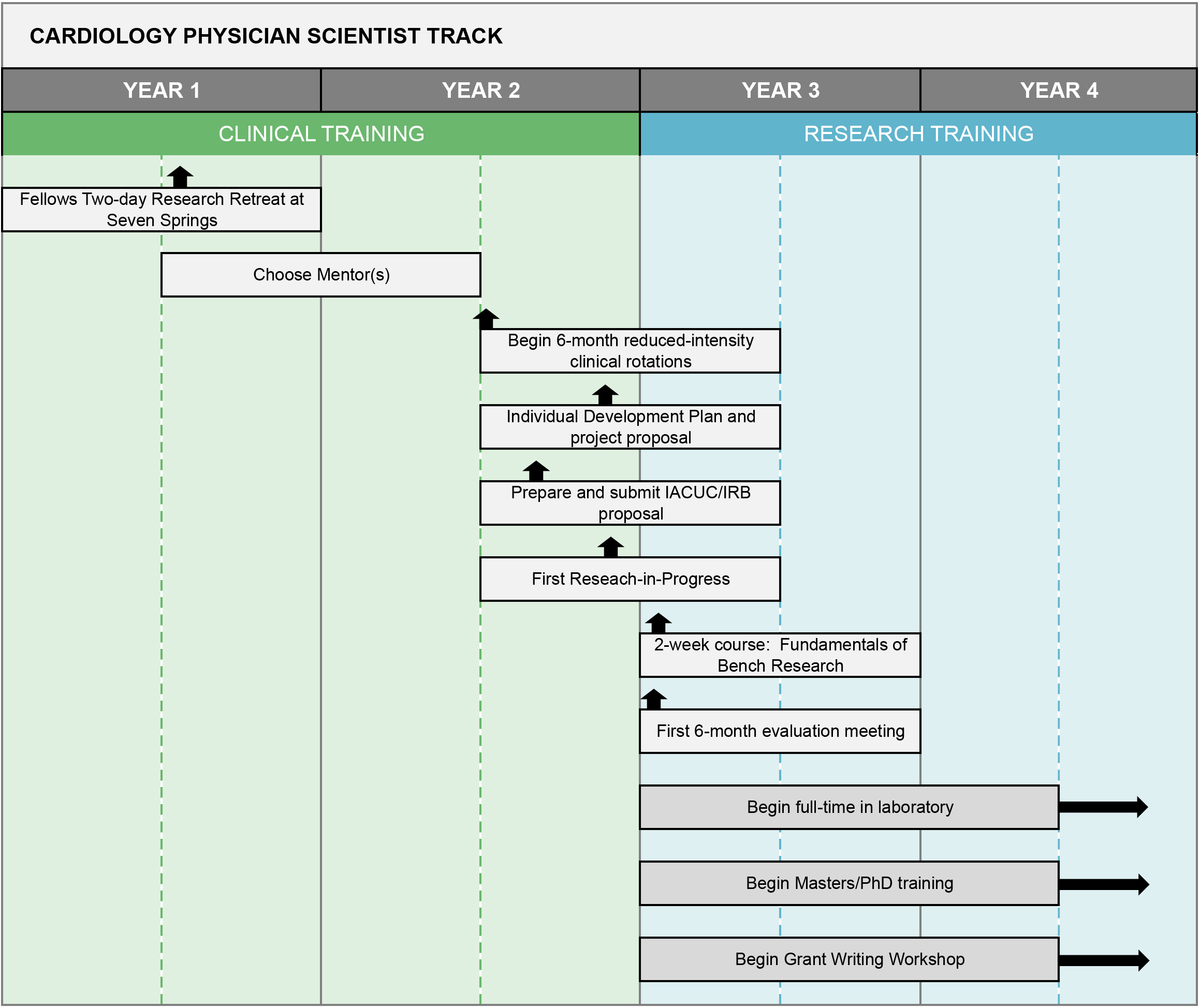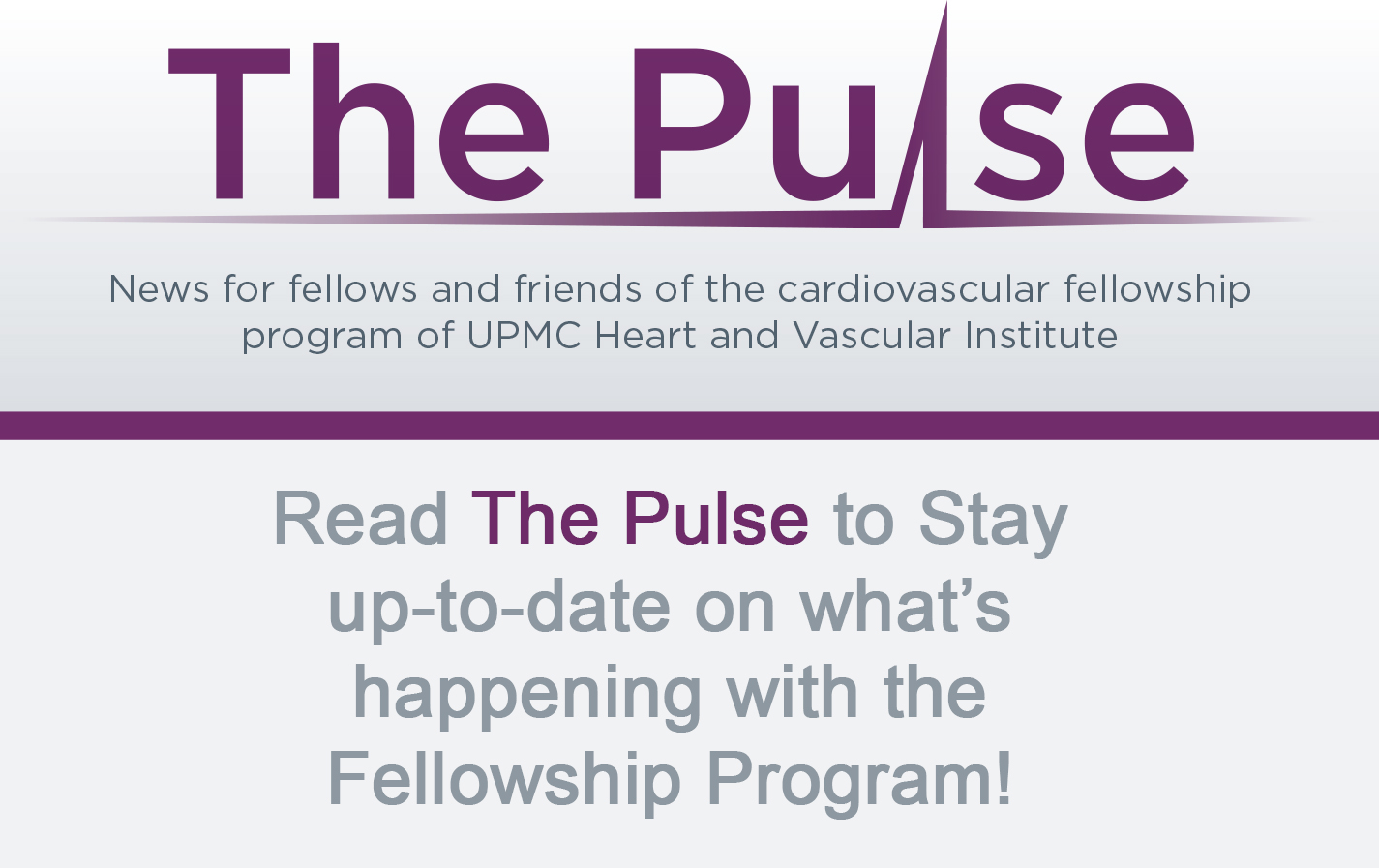Cardiovascular Fellowship Training Program
Fellowship Tracks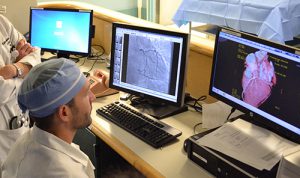
A three-year fellowship that trains leaders in all areas of cardiology. At a minimum, the training allows for completion of all ABIM and ACGME requirements, so that participants can sit for CV boards after the completion of their third and final year. Most fellows maximize their training time by individualizing their last year. Each fellow is given the opportunity in their third year to tailor their training to meet career development goals. For example, fellows may focus on research or achieve Level II/III certification in various areas of cardiology. Mentorship for both career and research is provided to all fellows by experienced and engaged faculty members in the HVI and throughout the UPMC system.
Cardiology Physician-Educator Track
A four-year fellowship track for individuals who are interested in pursuing formal training to become a Physician-Educator. The pathway includes completion of a Master of Science in Medical Education through the University of Pittsburgh’s Institute of Clinical Research Education. Fellows will concentrate the majority of their general clinical rotations in the first two years of fellowship. During the third and fourth year, fellows begin Master’s coursework; receive ‘hands-on’ educational experiences from senior educators and participate in educational committees; and participate in significant educational scholarship, including creating and implementing a research project.
Cardiology Physician-Scientist Track
A four- to five-year fellowship track for individuals who are interested in a career as an independent Physician-Scientist. Following their first two years of clinical training, fellows shift their focus to a research project with a faculty mentor(s) identified during their first year of training. The fellow is expected to present their findings at national meetings and submit first-author manuscripts for publication during their third and fourth years. Fellow progress is very closely monitored, with fellows meeting 3-4 times each year with a Research Committee composed of senior faculty members, as well as regularly presenting their on-going work at weekly fellow Research in Progress Conferences. Additionally, fellows will participate in monthly grant writing workshops to introduce and assist them with applications for Career Development Awards through NIH, AHA, and VA funding mechanisms.
Physician-Scientist Milestones:
Components of Physician-Scientist Research Training:
Fellows Research Career Retreat: Every February, Cardiology and the Vascular Medicine Institute hold an off-site retreat for first-year fellows with focused presentations by research faculty to expose new fellows to potential mentors and research projects. Spanning two days, the retreat also aims to build collaborations between Cardiology and the Vascular Medicine Institute, provides a great environment for fellows to network, and allows time for skiing or other recreational activities.
Research in Progress Conferences: Meeting weekly, the Cardiology/Vascular Medicine Institute Research in Progress Conference features two presentations given by fellows (or occasionally a junior faculty members). Presentations are 20-25 minutes long, allowing 5-10 minutes for questions and discussion. With the opportunity to present two to three times an academic year, fellows are able to improve their public-speaking skills in addition to eliciting helpful feedback and comments from more senior researchers.
Physician-Scientist Conference: A series of interactive seminar topics specifically designed as career development activities for physician-scientists. Topics include: ‘Publish or perish’ (understanding the journal editorial process); NIH peer review; mock study section; effective Powerpoint presentations; negotiating regulatory issues; interviewing and negotiating. The objective of the series is to expose beginning physician-scientists to the essential skills of academic life in an informal interactive environment.
CLRES 2700: Fundamentals of Bench Research (2.0 credit(s);An intensive two-week training program designed to teach fellows-in-training and future physician-scientists the core principles of scientific investigation. The course is organized such that fellows can learn the theory behind most of the common research approaches as well as new and innovative approaches of current scientific endeavors. In addition, participants acquire laboratory technical skills via a “learning by doing” approach in daily afternoon rotations.
Rotations at the NIH, FDA, and Industry: A unique aspect of our translational training is the incorporation of a full-time four week elective rotation at the FDA, intramural NIH Clinical Center Regulatory and Pharmacy Development Program, or in industry. This intensive exposure allows the trainee to develop the elemental and regulatory tools for translational research that are commonly not available in the traditional university academic setting.
Cardiology Fellow Research Grant: Funds of up to $10k per year are available on a competitive basis to fund the projects of cardiology fellows during their period of research training.
Grant-Writing Workshop: We provide a formalized grant writing workshop to prepare fellows for a range of career development awards through the NIH, VA, and AHA. Fellows meet monthly with a group of senior faculty to discuss all aspects of grant-writing strategy and to have drafts of the individual components of their grant (e.g. specific aims, significance etc.) critiqued by the whole group. We have experienced faculty, all R01-funded and serving on NIH study sections, to guide the workshop. Exposure of the fellows to each other’s projects in a supportive and nurturing environment produces rapid acquisition of grant-writing skills and contributes to the high success rates of our fellows with career development awards.
K-to-R Workshops: Organized to precede junior faculty’s first R01 submissions, the function of these workshops is to provide input on shaping the aims of the study, assess the strength of preliminary data, strategize about targeting study sections, and reviewing the biosketch to ensure competitiveness at the R01 level. The workshop traditionally occurs at the beginning of the third year of K-award funding, is scheduled for at least two hours, and is attended by senior faculty with extensive study section experience. The detailed feedback and constructive criticism increases the competitiveness of grants when reviewed by NIH study sections.
Semi-annual reviews: Throughout the research years, there is a formal review of progress at six-month intervals to ensure that the appropriate goals are being met. Assessments are made of knowledge base, research skills, presentation skills, achievement of milestones (abstracts, papers, grant applications, etc.), and the strength and adequacy of the mentoring environment. Providing a pathway for fellows to be stimulated and achieve success, the semi-annual reviews are conducted by the Division Chief, Fellowship Research Committee, and Mentors.
Division of Cardiology Academic Offices
Scaife Hall, 5th Floor
3550 Terrace Street
Pittsburgh, PA 15213
412-647-3429 | email
Heart and Vascular Institute (HVI)
For Patients: 1-855-UPMC-HVI (876-2484)
HeartAndVascular@upmc.edu | HVI website
UPMC Find A Doctor
For Physicians: 1-866-884-8579 | 412-692-2400
MedCall: 412-647-7000 | 1-800-544-2500



